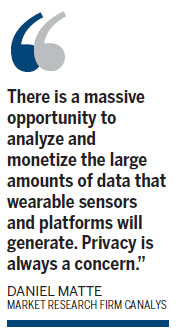Smartwear tech rubbing some the wrong way
A new generation of wearable technology is promising not only to log data about users' health but to predict and avert crises - from drivers falling asleep at the wheel to runners wearing themselves out in a marathon.
But there are concerns over the accuracy of the personal information collected by the burgeoning range of smart wristbands, watches and clothing - and how companies might use that data.
Wearable technology is the fastest growing category at this year's Computex, Asia's largest tech trade show that kicked off in Taiwan on Tuesday, with health-tracking a dominant theme.
"Health and fitness sensors and data are fundamental for wearables and largely define the category," said Daniel Matte of market research firm Canalys.
IDC Tracker predicted in April that sales of wearable tech items would triple this year to 19 million units worldwide, growing to 111.9 million by 2018.
At Taiwan smartwear company AiQ's Computex stand this week, a muscular mannequin showed off a Lycra cycling top.
Stainless steel fibers in the fabric and electrodes in the sleeves sense heart rate and other vital signs as well as calories burned, sending the data to a Bluetooth clip that can transmit it to a phone, tablet or other device.
The technology will appeal to sports fans, but it is Taiwan's bus drivers who will be the first to benefit, when companies ask them to wear smart shirts later this year in a move that could prevent accidents.
"We will provide a shirt which can monitor the drivers in case they are falling asleep, or in case any vital signs are not OK, and it will provide a signal or a warning to the bus company," said AiQ Vice-President Steve Huang.
The clothing was tested for a year on discharged hospital patients to track their condition and it received positive feedback from wearers, he added.

But analysts and consumers still have reservations about whether smartwear can really tell us the truth about our bodies.
"Current sensors are not very accurate, but there will be improvements," said Matte.
Samsung unveiled a new digital health technology platform last week that uses sensors to track a range of body functions such as heart rate and blood pressure.
And another giant of the sector, Apple, also launched its "Health" app this week, with speculation mounting it will move into hardware later this year.
Leading Taiwan tech firm Acer also revealed its first wearable at Computex - a fitness-tracking wristband that links to a smartphone.
But while tech firms jump on the health-monitoring bandwagon there are questions over how the huge flow of data from the new devices will be handled.
"There is a massive opportunity to analyze and monetize the large amounts of data that wearable sensors and platforms will generate. Privacy is always a concern," Matte said.
Huang acknowledged the tension between the potential commercial benefit for smartwear firms and the risk of invading users' privacy.
"There will be a lot of legal and moral issues," he said.
(China Daily 06/06/2014 page10)














